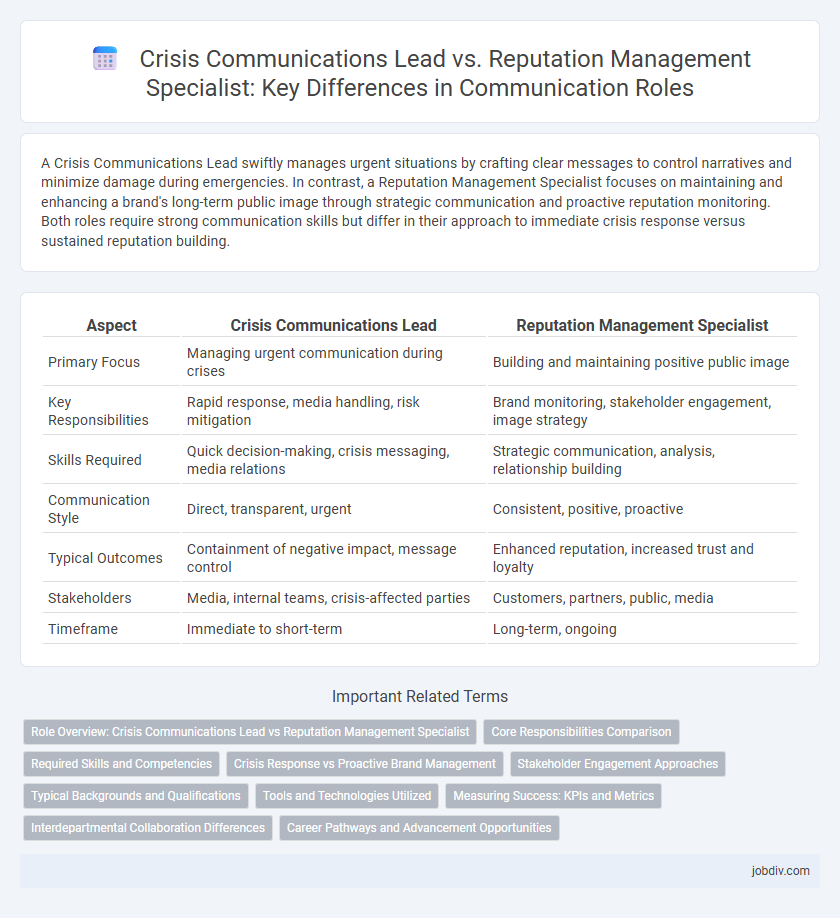A Crisis Communications Lead swiftly manages urgent situations by crafting clear messages to control narratives and minimize damage during emergencies. In contrast, a Reputation Management Specialist focuses on maintaining and enhancing a brand's long-term public image through strategic communication and proactive reputation monitoring. Both roles require strong communication skills but differ in their approach to immediate crisis response versus sustained reputation building.
Table of Comparison
| Aspect | Crisis Communications Lead | Reputation Management Specialist |
|---|---|---|
| Primary Focus | Managing urgent communication during crises | Building and maintaining positive public image |
| Key Responsibilities | Rapid response, media handling, risk mitigation | Brand monitoring, stakeholder engagement, image strategy |
| Skills Required | Quick decision-making, crisis messaging, media relations | Strategic communication, analysis, relationship building |
| Communication Style | Direct, transparent, urgent | Consistent, positive, proactive |
| Typical Outcomes | Containment of negative impact, message control | Enhanced reputation, increased trust and loyalty |
| Stakeholders | Media, internal teams, crisis-affected parties | Customers, partners, public, media |
| Timeframe | Immediate to short-term | Long-term, ongoing |
Role Overview: Crisis Communications Lead vs Reputation Management Specialist
A Crisis Communications Lead manages urgent messaging and media relations during high-pressure situations to mitigate negative impact and maintain public trust. A Reputation Management Specialist focuses on long-term strategies to build, monitor, and improve an organization's public image across multiple channels. Both roles require expertise in stakeholder engagement and strategic communication but differ in timing and objectives--immediate crisis response versus ongoing brand reputation enhancement.
Core Responsibilities Comparison
The Crisis Communications Lead primarily focuses on managing urgent communication during emergencies, crafting immediate messaging to control damage and maintain stakeholder trust. In contrast, the Reputation Management Specialist works proactively to build and protect brand image through ongoing strategies, monitoring public perception, and addressing potential risks before they escalate. Both roles require expertise in media relations and stakeholder engagement but differ in timing and tactical emphasis within corporate communication frameworks.
Required Skills and Competencies
A Crisis Communications Lead requires expertise in rapid decision-making, media relations, and strategic messaging under pressure to effectively manage unfolding emergencies. A Reputation Management Specialist must excel in long-term brand monitoring, sentiment analysis, and proactive stakeholder engagement to maintain and enhance organizational image. Both roles demand exceptional communication skills, emotional intelligence, and the ability to adapt messaging to diverse audiences across multiple platforms.
Crisis Response vs Proactive Brand Management
Crisis Communications Leads specialize in rapid crisis response, managing critical messaging to mitigate damage during emergencies and protect organizational integrity. Reputation Management Specialists focus on proactive brand management, cultivating positive public perception through ongoing strategic communication and monitoring. Effective communication strategies require balancing immediate crisis intervention with sustained efforts to enhance and maintain brand reputation.
Stakeholder Engagement Approaches
Crisis Communications Leads prioritize rapid, transparent, and consistent communication to manage urgent issues and mitigate reputational damage during high-pressure situations. Reputation Management Specialists adopt a long-term, strategic approach to stakeholder engagement, fostering trust and credibility through continuous dialogue and proactive reputation-building initiatives. Both roles utilize tailored messaging and stakeholder analysis to address audience concerns effectively, but Crisis Communications Leads focus on immediate impact, whereas Reputation Management Specialists emphasize sustained relationship management.
Typical Backgrounds and Qualifications
Crisis Communications Leads typically possess backgrounds in public relations, journalism, or corporate communications, often holding degrees in communications, marketing, or related fields, with experience in managing high-pressure scenarios and media relations. Reputation Management Specialists usually have expertise in brand management, digital marketing, or public relations, complemented by skills in online reputation monitoring, SEO, and stakeholder engagement, along with degrees in communications, business, or marketing. Both roles demand strong strategic thinking, excellent communication skills, and the ability to analyze audience sentiment to protect and enhance organizational image.
Tools and Technologies Utilized
Crisis Communications Leads primarily use real-time monitoring platforms like Meltwater and AlertMedia to track and respond to emerging threats, alongside mass notification systems for rapid outreach. Reputation Management Specialists leverage advanced SEO tools such as SEMrush and Brand24 for sentiment analysis and online reputation tracking, integrating CRM systems to personalize stakeholder engagement. Both roles increasingly rely on AI-driven analytics and social media management software to optimize message effectiveness and audience targeting.
Measuring Success: KPIs and Metrics
Crisis Communications Leads measure success through metrics such as response time, message reach, sentiment analysis, and the speed of issue resolution, emphasizing immediate impact and stakeholder reassurance. Reputation Management Specialists focus on long-term KPIs including brand sentiment trends, media coverage quality, social media engagement, and net promoter score (NPS) to gauge sustained public perception. Both roles rely on data-driven insights but apply different performance indicators aligned with crisis urgency versus reputational health.
Interdepartmental Collaboration Differences
A Crisis Communications Lead collaborates intensively with legal, HR, and executive teams to manage urgent situations and ensure consistent internal and external messaging under pressure. In contrast, a Reputation Management Specialist works closely with marketing, public relations, and customer service departments to build and maintain a positive brand image over time. The Crisis Communications Lead's interdepartmental focus centers on rapid response coordination, while the Reputation Management Specialist emphasizes long-term brand perception and stakeholder engagement strategies.
Career Pathways and Advancement Opportunities
Crisis Communications Leads specialize in managing urgent organizational threats, often progressing to executive roles such as Chief Communications Officer or Director of Crisis Management by developing expertise in rapid response and stakeholder engagement. Reputation Management Specialists focus on long-term brand integrity through strategic messaging, advancing toward positions like Brand Strategy Director or Corporate Affairs Manager by mastering media relations and public perception analytics. Both career pathways offer advancement opportunities in high-impact communication leadership roles across corporate, nonprofit, and governmental sectors.
Crisis Communications Lead vs Reputation Management Specialist Infographic

 jobdiv.com
jobdiv.com